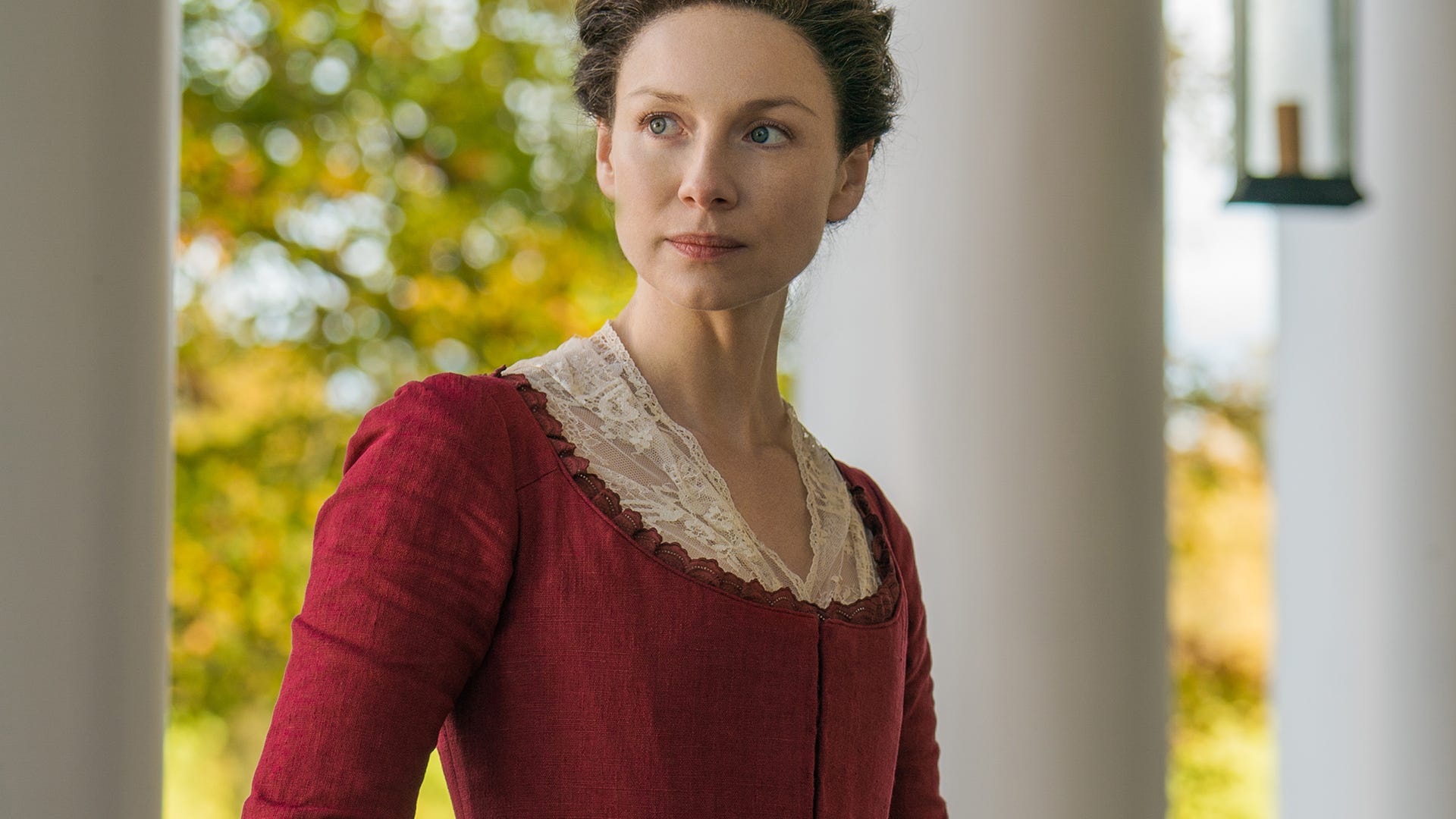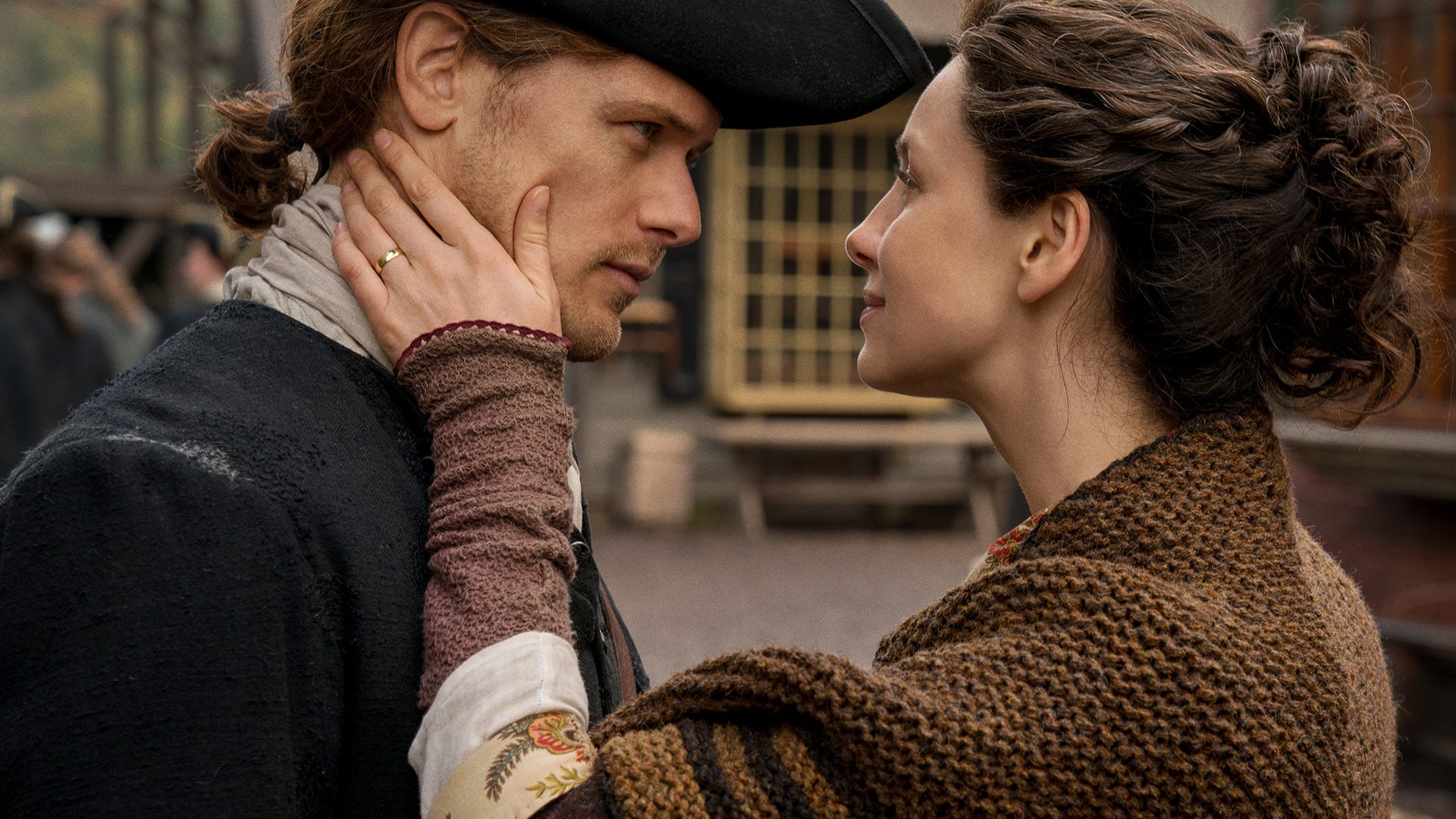Join or Sign In
Sign in to customize your TV listings
By joining TV Guide, you agree to our Terms of Use and acknowledge the data practices in our Privacy Policy.
Outlander and the Cost of Claire's White Saviordom
Why slave narratives are trick for even the best written shows
An Outlanderepisode on slavery was inevitable the second the Frasers set foot in 18th century America. The time-traveling drama touched on the cruelty of the slave trade in Season 3 when Claire (Caitriona Balfe) inadvertently stumbled into a slave auction and bought a man for sale to save him from further humiliation in the market square. She later set him free once he helped Claire and Jamie (Sam Heughan) find Jamie's nephew, but it was only a brief dalliance with the topic.
Season 4 took a deeper look at slavery in the Americas in its second episode as Claire and Jamie arrived at Jamie's Aunt Jocasta's (Maria Doyle Kennedy) plantation, River Run. Claire's distaste for the practice was immediately made clear. The audience understood Claire's perspective because we know she's an enlightened woman from the 1960s who knows how the effects of slavery will still be present some 200 years after her River Run stay, but for those in the show without knowledge of the future, her stance was not only contrary, but dangerous to their way of life.
Discover your new favorite show: Watch This Now!
That's taken to another level when a slave named Rufus (Jerome Holder) took an axe to his overseer's ear. Claire and Jamie were dispensed from the main house to attend to the wounded man, only to find that he already took justice into his own hands and strung Rufus up to a tree with a rusted hook in his abdomen. Claire's attention immediately went to the slave being tortured and she put his life above that of his injured overseer. Things went downhill from there.
Despite the warnings from literally everyone around her, Claire brought Rufus back to the main house of the plantation, operated on him on Jocasta's dining room table and saved his life -- for a few hours. The price of any slave drawing blood from a white man in that time period was death. Claire saved Rufus from the hook, but there was no way to save him from death overall. As she struggled to find an escape for the slave boy, an angry mob descended on Jocasta's house and demanded justice. Rather than hand Rufus over to the mob, Claire reluctantly poisoned him in order to give him a peaceful death rather than a violent one. Still, Jamie had to turn the boy's body over to the mob, which promptly dragged it through the mud and then strung his corpse up in the nearby tree as the Frasers watched powerless from the porch.
The preview for next week's episode showed that the Rufus incident will push Claire and Jamie onwards to settle Fraser's ridge, which was always the intended arc for this season. The slaves on Jocasta's plantation and in the surrounding area will stay behind in the heightened hostility caused by Rufus' actions and Claire's savior complex.

Caitriona Balfe, Outlander
Aimee Spinks"In this episode she's so lead by her emotions and she's not really thinking it through. What she sees in the moment, she just wants to help Rufus and doesn't think about the larger implications of what it will do to everyone else on the plantation," Balfe told TV Guide. "I think that's why she's so eager to get away from River Run, because for her to stay there in that position makes her feel complicit in the whole slave system or the system of slavery. It's not something she feels at all comfortable with. Obviously, her actions have probably made the conditions worse for every slave on that plantation."
And there we have our issue. Claire's actions in this episode have made the lives of an entire group of people she barely interacted with that much harder in a time period that wasn't trying to cut them a break in the first place. As this is a story about Claire and Jamie's adventures in the 18th century, we won't see exactly how those tribulations shake out. Instead, the pain of those slaves, directly increased by Claire's impulsive desires, are used as a catalyst for the Frasers' next chapter. It's a tool to propel the journey of white characters, and frankly, it's infuriating.
Outlander Just Introduced the First Worthy Villain Since Black Jack Randall
I am an Outlander fan and also a woman of color, which makes watching episodes like this deeply personal and complicated -- perhaps more so than for fans without African-American ancestry. Most weeks, there's no need to divide the fan base along racial lines. We are all escaping into a fantasy where strapping tall Scottish men sweep us sassenachs off our feet for an hour every Sunday. I have to use a little more imagination perhaps, but who cares? Jamie Fraser is worth it.
But then Jamie and Claire stepped foot in America. I knew the slave episode was coming, even if I haven't finished Diana Gabaldon's novels on which the series is based. On weeks like this, I don't get to be like most Outlander fans, even with a little extra imagination. I can't pretend to be Claire, a noble woman from the future inheriting a plantation with her gorgeous Scottish husband, because no amount of imagination can erase the fact that if I traveled back in time to River Run, I'd end up as one of Jocasta's belongings rather than an honored guest. For this episode, I spent my time relating to the slaves on Jocasta's plantation that Claire interacted with rather than her, no matter how good her intentions were. I understood their fear when she did rash things. I understood the quiet way they tried to warn her that what she was doing would end badly for everyone involved, afraid to speak out in case they would end up like Rufus.
Outlander Season 4 Review: America Isn't Easy for Jamie and Claire
I can appreciate Claire's intentions in this episode and understand that she meant well. She was trying to be on the morally right side. I also know that a show set in 18th century America can't ignore an issue as big as slavery. Outlander has an obligation to depict the time periods that its characters inhabit accurately. Claire couldn't save Rufus because that never would have realistically happened. She can't singlehandedly end slavery, even for a small group of black people in North Carolina, because Season 2 proved with the battle of Culloden, history is fixed for this show. Outlander also has to be careful about how it deviates from the novel series, for every change it makes has larger ramifications down the line. They can't delete an important section of the book because it might make a section, and probably a small one at that, of the audience uncomfortable.
As I do these mental gymnastics to understand why this episode exists in the way that it does, I have to wonder did the show do any gymnastics of its own on my, and the fans like me's, behalf? A Google search of all the writers listed on the show's IMDB page revealed the Outlander writers' room is all white, and like Claire they undoubtedly had great intentions with this episode. But I have to wonder how the story might've been tweaked if there had been a person whose actual family history includes people represented the people on screen -- people who might've cautioned that Claire's remorse doesn't make up for her ignorance, and repeated dismissal of the black people in this episode begging her to stop what she was doing. Her need to validate her own emotions were put ahead of these people's agency. In trying to be their savior, Claire actually robbed them of the little agency they had in that situation and her grief still took center stage.
Now You Can Get Your Outlander Fix Through Hulu!
I know she felt horrible about poisoning Rufus and it was hard for her to watch his lifeless body swing from that tree, but I also know it was harder for the enslaved housemaids watching a few feet away. It will also be hard for them to burn the tablecloths Rufus laid on, and probably the dining room table as well where his black blood was spilled -- blood considered poison to everything it touched. These are things that don't occur Claire as she insisted she was right and knew what was best for Rufus. These are things she can push away as she settles her new land away from River Run, which is the problem with white saviors stepping into black narratives. They step out just as easily, whether they actually saved anyone or not. The black people left behind, and their descendants watching the stories about their struggles, do not get that luxury.
This is not a call to boycott Outlander. I am still a rabid fan and some of my favorite stuff this show has ever done occurs in the upcoming episodes this season. I am just angry at Claire in this episode, but not in the same way you get angry at your favorite TV characters who do stupid things like try to negotiate with Black Jack Randall (Tobias Menzies) by themselves or treat their first husbands like garbage for reasons said husbands can't control. It's a deep-bodied, seething anger that is difficult to articulate. It's not like I'm actually one of the slaves stuck on Jocasta's plantation, but I am a person that still sees the ramifications of that time period still alive and well in 2018.
Wait, Is That Frank's Voice in the Outlander Season 4 Trailer?
In this month alone voter suppression deterred tens of thousands, if not more, black people and other people of color from voting in Georgia, Florida and North Carolina. Our sitting president said that black people are too stupid to vote for him, amid other racist remarks and then invited the leader of a white nationalist group to the White House. There are still real people fighting against the oppression instilled in the DNA of this country, where the institution of slavery still lingers and the racist beliefs required to dehumanize black people flourish out in the open. Nevermind the exhausting microaggressions people of color experience on the regular, Claire's actions in this episode are a reminder of the allies who show up to the marches and write the eloquent Facebook posts, but then don't show up to vote when it truly matters.
So at the end of the week when I wanted to watch one of my favorite shows, I didn't want to have the scars of the past reopened for the sake of Jamie and Claire's next settlement. I especially didn't want to have to do mental and emotional hula hoops to understand Claire's entitlement and subsequent grief. I wanted an escape, and just like the slaves Claire's white saviordom failed in this episode, I was denied.
Outlander continues Sundays at 8/7 on Starz.
PHOTOS: These Outlander Season 4 Photos Will Send You Into a Shipping Frenzy

Sam Heughan and Caitriona Balfe, Outlander
Aimee Spinks